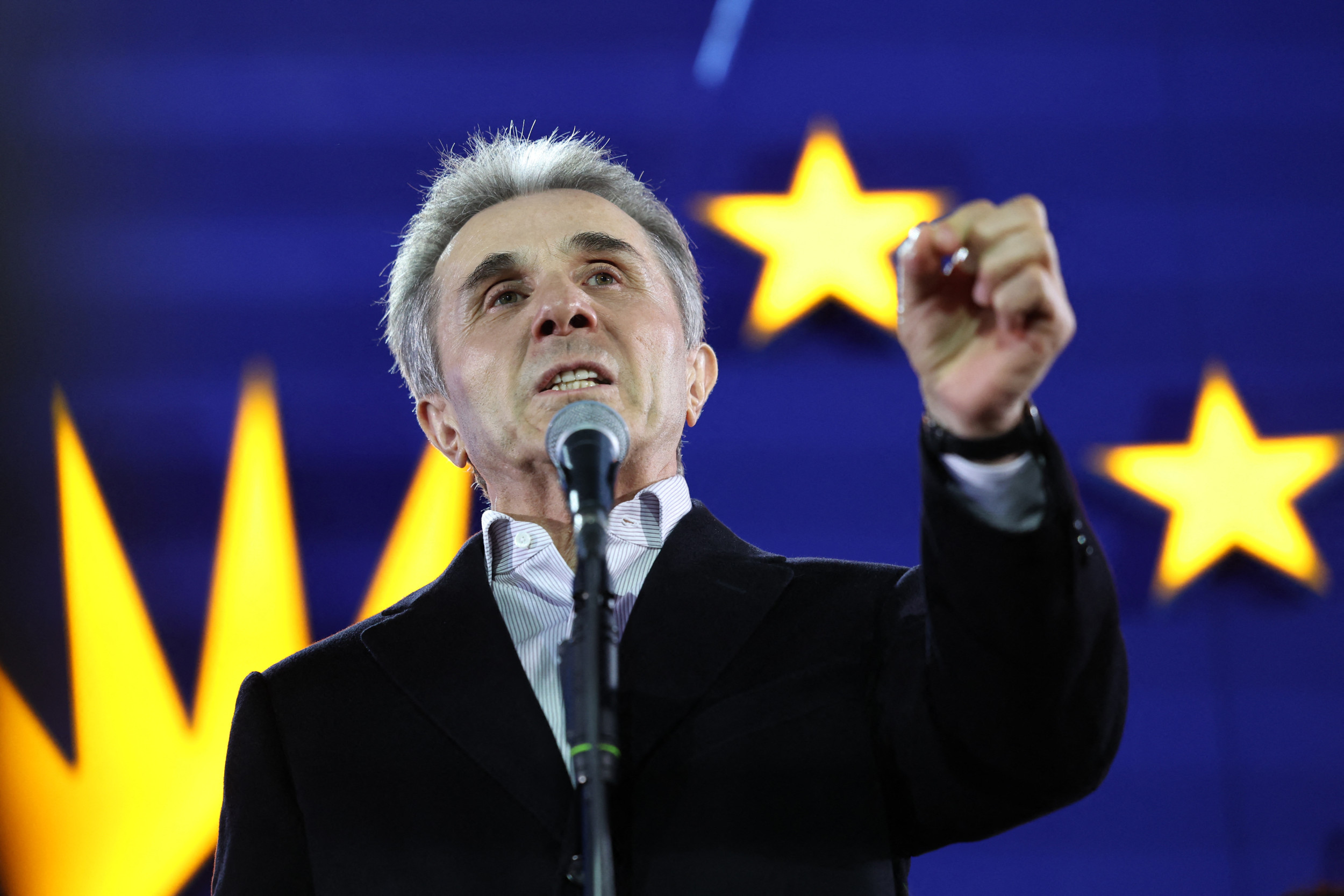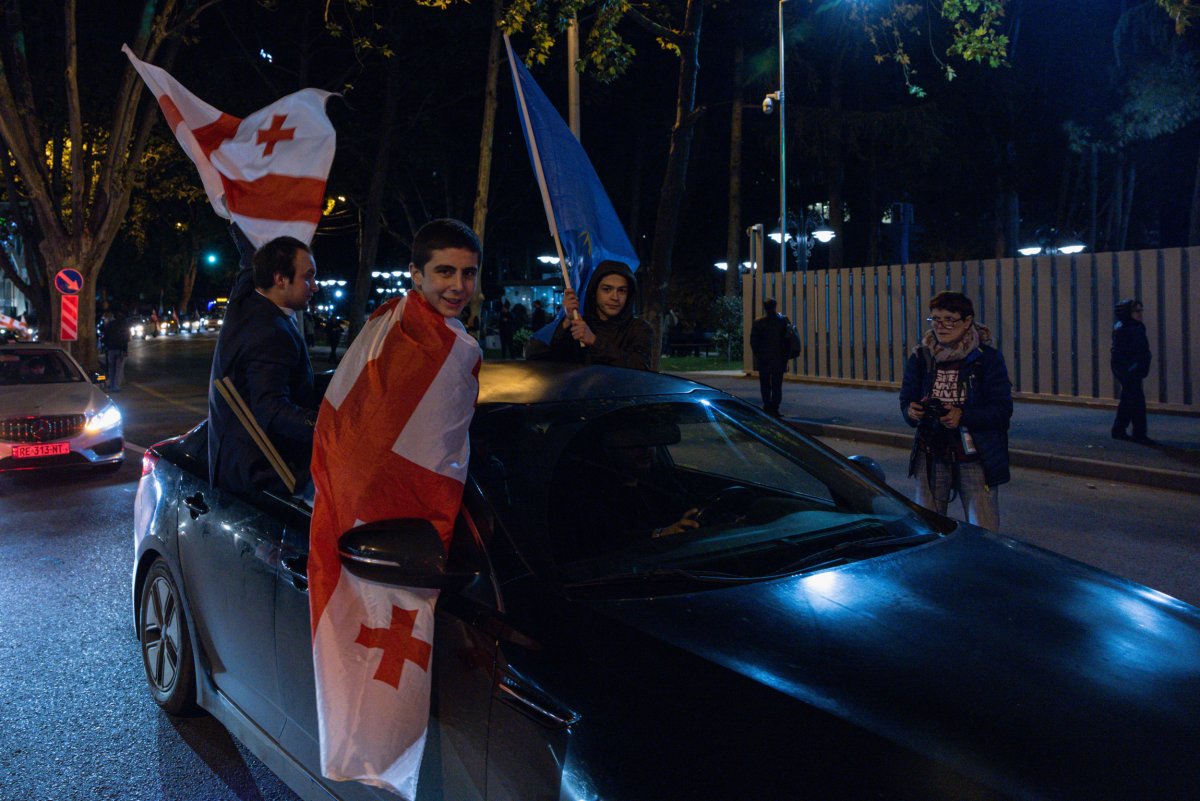
Election officials in Georgia have said the ruling party got most votes in an election whose result one expert has said is likely to be welcomed by Russian President Vladimir Putin.
Despite exit polls for opposition TV channels suggesting the four opposition parties had won, preliminary results from Georgia’s Central Election Commission (CEC) gave the Georgian Dream party 54 percent in Saturday’s ballot, which was marred by claims of systemic violations both on the day and beforehand.
Georgia’s Western-leaning President Salome Zourabichvili said she did not recognize the results of the election. She called it a “total robbery” and said that the Georgian people witnessed a “Russian special operation,” suggesting unspecified large-scale Russian interference. Newsweek has contacted the Russian Foreign Ministry and Georgian Dream by email for comment.
GIORGI ARJEVANIDZE/Getty Images
The Georgian election monitoring group International Society for Fair Elections and Democracy told Newsweek that the results “cannot be seen as truly reflecting the preferences of Georgian voters.”
ISFED said that, while its Parallel Vote Tabulation (PVT) was consistent with the results announced by the CEC, fundamental flaws in preelection and election day processes impacted voters’ ability to express their free choice.
These included during the preelection period such as voter pressure, intimidation, confiscation of identity cards and voter bribery. On Saturday, ISFED documented ballot stuffing, multiple voting, voter bribery, expulsion of observers from polling stations and mobilizing voters outside polling stations.
The plebiscite was considered the most important in Georgia since its independence from the Soviet Union and has set back its aspirations to join the European Union, which is reportedly backed by 80 percent of the country.

Diego Fedele/Getty Images
Georgian Dream founder Bidzina Ivanishvili has vowed to ban opposition parties whose defeat is feared to move the country toward Moscow’s orbit.
It has been called increasingly authoritarian, passing Russian-style laws targeting media and nongovernment groups that get foreign funding, and the LGBTQ+ community. The EU has frozen Georgia’s bid to join the EU due to “democratic backsliding,” only months after being awarded candidate status.
Putin’s closest EU ally, Hungarian Prime Minister Viktor Orban, congratulated Georgian Dream on securing a fourth term and is due to travel to the country on Monday.
“This is a welcome result for Moscow,” Olga Oliker, director, Europe and Central Asia program of the International Crisis Group, told Newsweek in emailed comments. “Russia sees the country as a prize in a contest with the EU, which had offered Tbilisi candidacy. This last now seems unlikely to move forward anytime soon,” she said.
The opposition has pledged to contest and protest the results on Monday, and Georgian Dream has reportedly deployed riot police to the capital Tbilisi. “It is opposition candidates, activists, and facilities that are facing violent attacks,” said Oliker. “This is already ugly, and will almost certainly get uglier.”
However, Georgia’s Prime Minister Irakli Kobakhidze has rejected claims of vote-rigging and violence, telling the BBC that there had been a “landslide” election result and that “irregularities happen everywhere, in every country.”
Prior to the vote, the four opposition parties had vowed to band together to form a majority in the 150-seat Parliament against Georgian Dream, which was expected to win a plurality.
However, Coalition for Change, which came second with 11.2 percent and United National Movement (UNM) that came in third, have said they will boycott Parliament in which the ruling party will hold 89 seats. This is short of the “constitutional majority” of 113 seats required to enact the constitutional changes Georgian Dream had hoped for.
Oleg Ignatov, senior Russia analyst from the International Crisis Group, said that the possible victory of the Georgian Dream party shows that, despite support for integration with the EU and NATO, “the idea of maintaining predictable and normal relations with Moscow still holds substantial backing in Georgian society.”
“This represents an important signal for Kremlin policy in the post-Soviet space, which could become a model conflict in the region for the coming years,” Ignatov added.
